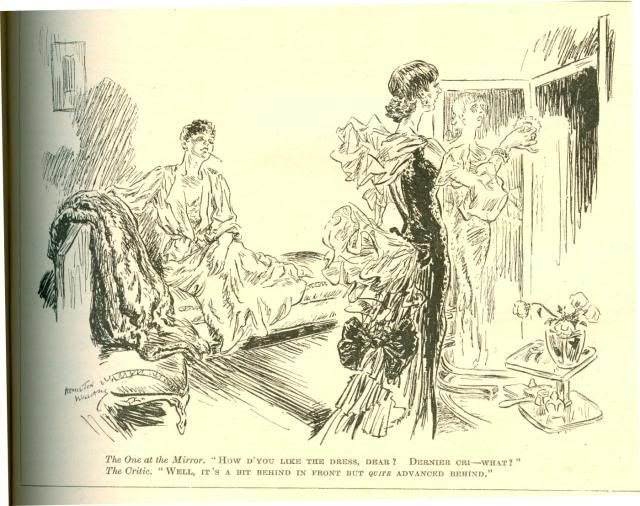
1935: Fashion Note
It is clear that the wearer of the new dress is much more impressed by it than the onlooker. The critical one is latching on to the French word ‘dernier’ which can mean last as in latest. It can also mean rearmost.

1935: Fashion Note
It is clear that the wearer of the new dress is much more impressed by it than the onlooker. The critical one is latching on to the French word ‘dernier’ which can mean last as in latest. It can also mean rearmost.
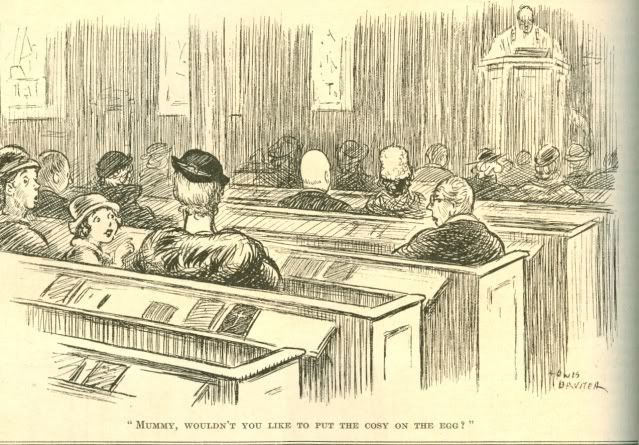
1935: Something To Think About
The sermon is way above her head so she is thinking constructively. It would have been wiser to keep this thought to herself. In time she will learn to do so.
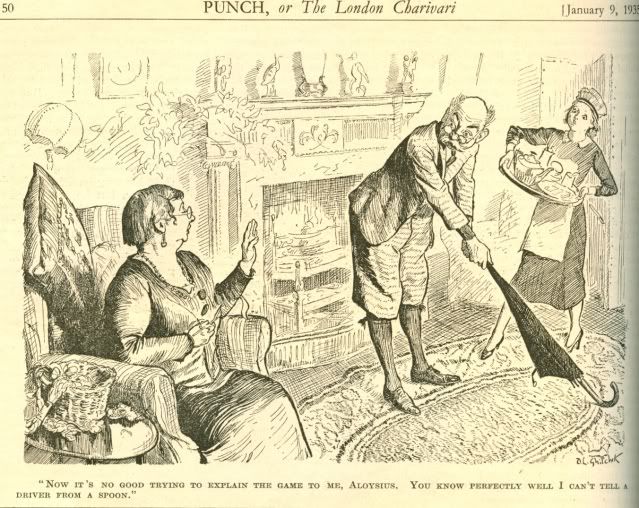
1935: Explaining the Finer Points of Golf
The joke is fairly feeble but the drawing is rather evocative. We see by the clothes worn and the cluttered furnishings that Aloysius and his wife are quite old-fashioned for 1935. The maid needs to take evasive action so as not to drop the tea tray.
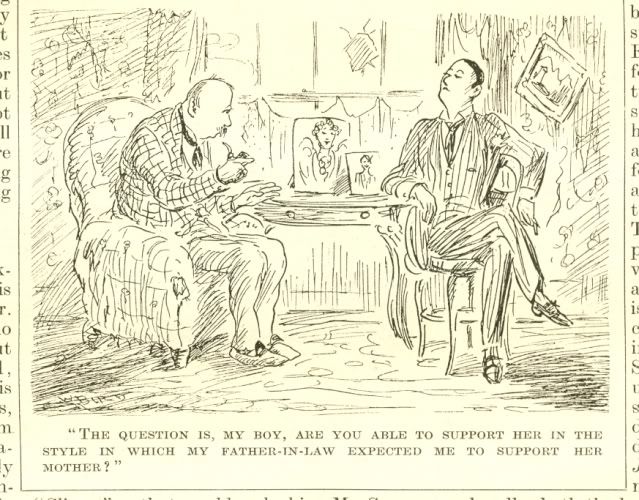
1935: Do As I Say Not As I Do
I am not sure whether fathers would still be asking this kind of question by 1935. (In 1963 my future father in law didn’t ask me this question although he diplomatically showed a great interest in my line of work.) In this instance the question is being expressed slightly differently because when he was the suitor the current father had abysmally failed in his assurances.
The current suitor looks more likely to come up to scratch.
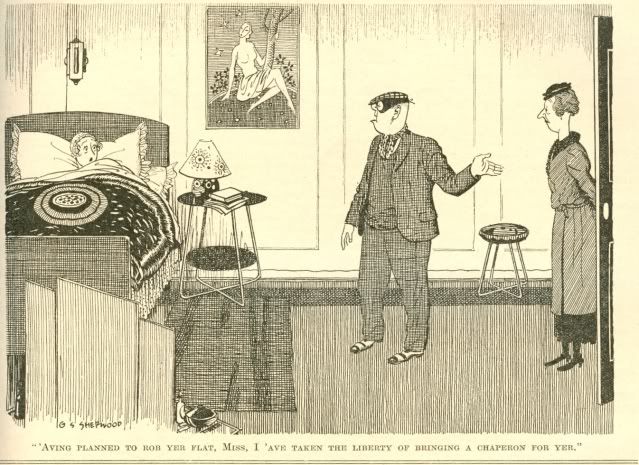
1935: Considerate Burglar
Obviously this is just a fantasy but there seemed to be no limit to the appetite for burglary jokes in 1935. The effects of the Great Depression would have tempted many of the workless to this way of life. The jokes always show the burglars in contact with the affluent people they were robbing.
Here, a suitably masked burglar seeks to reassure the young woman that he only wants to steal her property. There will be no ‘funny business’ as guaranteed by the presence of a chaperone. She would presumably be his wife who would also want there to be no ‘funny business’.
He thus presents himself as a ‘decent criminal’. I remember that during the troubles in Northern Ireland the Ulster Police would distinguish between the terrorists and ‘ordinary decent criminals.’
We note the deference with which the burglar addresses his victim.
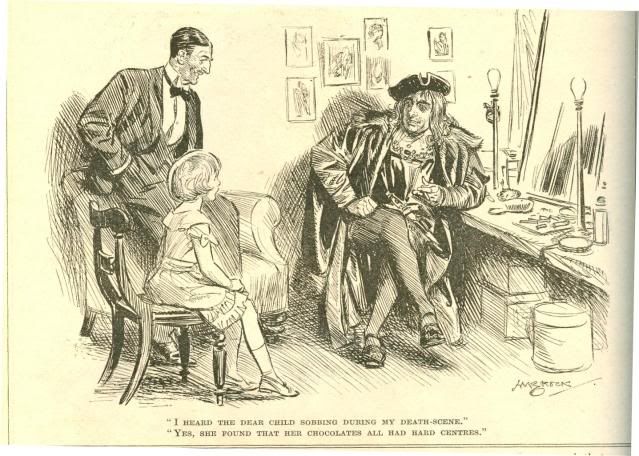
1935: The Real Tragedy
Typically of luvvies in every age the actor is convinced that his skill has caused the tears. The ‘dear child’s’ father takes pleasure in puncturing the thespian’s self-absorption.
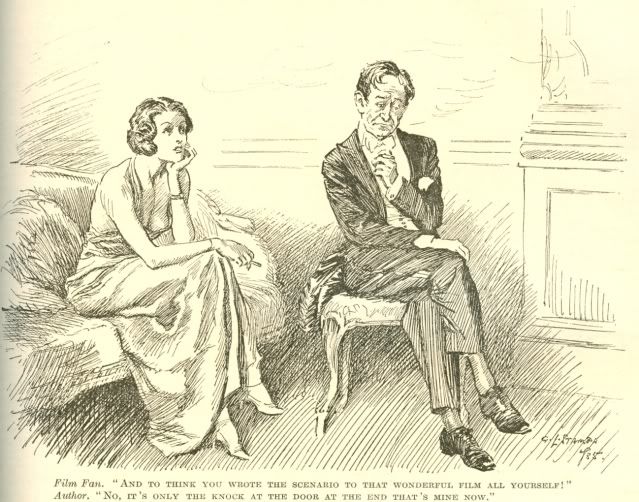
1935: The Rewrite Syndrome Goes Back a Long Way
The author ruefully admits that the film bears just about no resemblance to the book on which it is based. Much the same now.
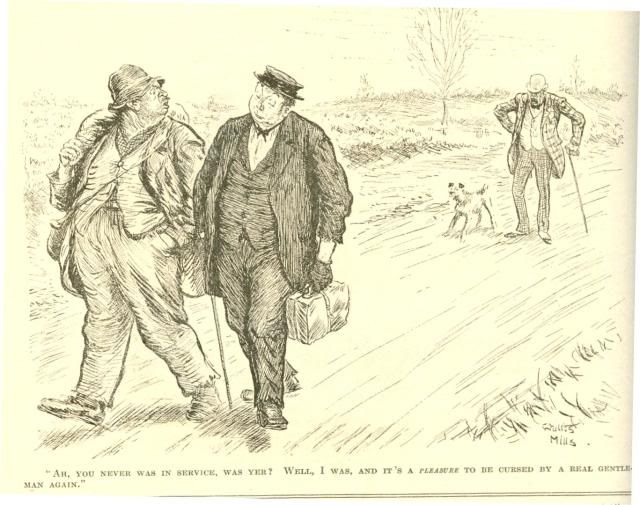
1935: Another Sign of the Depression
The slump did not only lead to an increase in burglaries. Without a safety net worth talking about many more were now both workless and homeless. These ‘gentlemen of the road’ would wander about, sleeping rough, seeking some income being doing odd jobs. As often as not they would be sharply told to be on their way.
The cartoonist is here showing the tramp on the right being actually pleased to be cursed by ‘a real gentleman again.’ He said that he had been in service. By the look of him he may well have been a butler in happier times. We can see that in spite of very straitened circumstances he has kept himself more respectable looking than his companion. I’m not sure that such a man would really be pleased in this way. Perhaps the target audience were expected to think this to be likely.
The incidence of tramp cartoons is much rarer than burglary jokes. All the jokes centre on the interaction between with them and those who are comfortably placed. Clearly the artists consider that burglars give greater opportunities for the humour that the readers of Punch would appreciate.
Today neither situation would be considered a likely source of comic material.
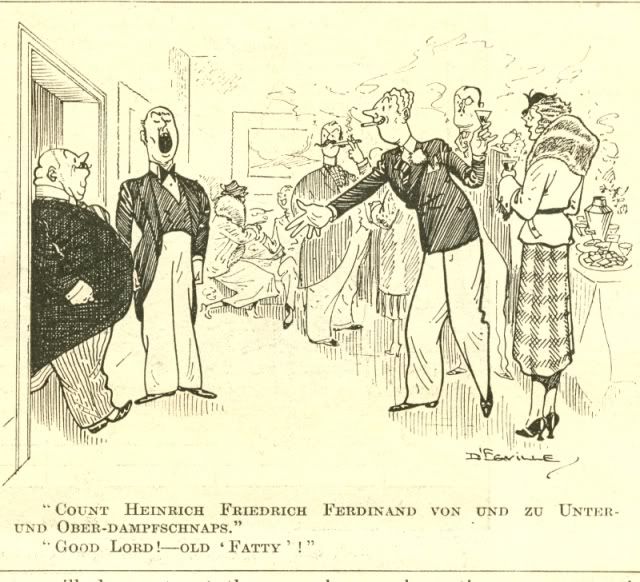
1935: They Were at School Together!
The diminutive and rotund German aristocrat is by no means angry at this unflattering sobriquet. He is positively beaming with pleasure at the knowledge that he is among friends. The visceral mutual hatred between Britons and Germans during the Great War is now well in the past. School memories can now be revived without that other matter getting in the way.
The cartoonist is ignoring the fact that by 1935 Hitler was in control of Germany. No doubt the aristocrat was also ignoring him as well, considering him just a funny little upstart. Time would show that this was not true.
The title, by the way, is a joke in itself. I don’t know how to interpret ‘dampfschnapps’ correctly. ‘Damp brandy’ doesn’t make much sense but perhaps it isn’t meant to. Apparently he is the Count of and to under and over Dampfschnapps.
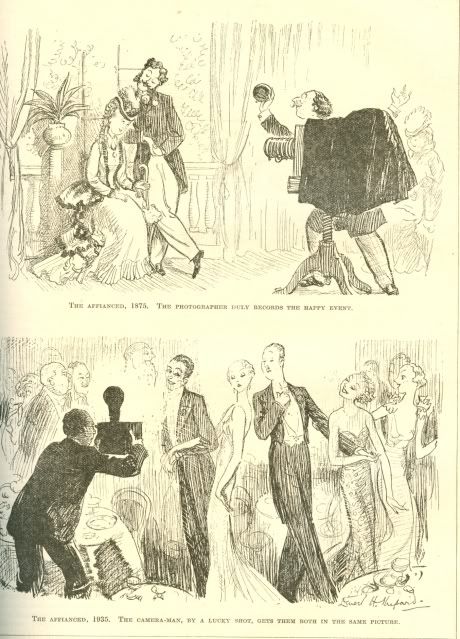
1875 vs. 1935: Technology Advance?
In 1875 the photographer was the master of the situation. He could reasonably expect that everything should be arranged to fit in with the needs of this new discovery.
By 1935 we are told that the engagement party was so blasé that the photographer had to snatch his opportunity to get the pair into the same shot. This seems odd. Surely they could have made an appointment to visit the photographer’s studio to have a picture taken.
As late as 1963 the future Mrs M and I had a joint picture taken at a photographer’s studio on our engagement so that copies could be sent to various relatives. I rather think that the high street studio is now verging on the obsolete. Photography has obviously moved on and most professional photographers now operate in a different business model.

1935: Do You Prefer Your Dog to Bite or to Bark?
Once again George Belcher brings us down to earth by ignoring the concerns of the affluent. The pet shop owner has the situation under control. The customer will surely prefer a barking dog to a biting dog.
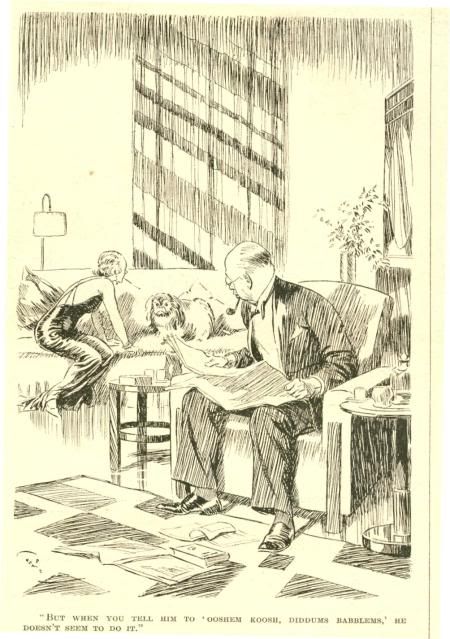
1935: The Object of her Affection
The husband vaguely notices that it is not he who is the object of her affection. Looking at him it is not difficult to see why this should be the case. The dog does not seem to relish its role. Perhaps the proximity of her lighted cigarette is sufficiently off-putting.
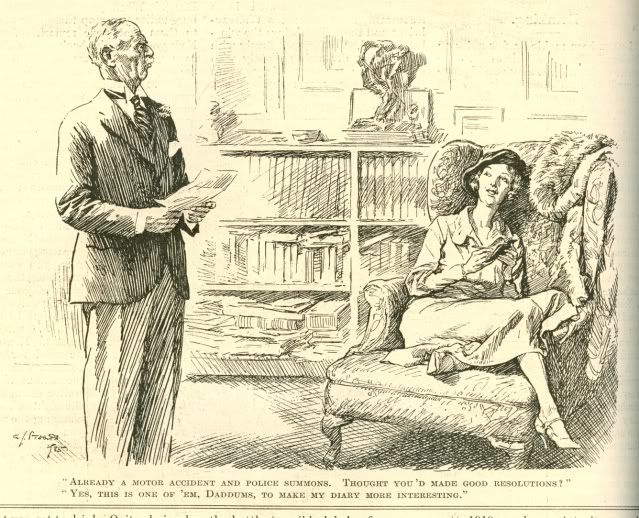
1935: The Prodigal Daughter
Clearly the woman is unmarried since it is her father who is getting so hot under his winged collar about her driving offence. I would guess that she has no employment since that was considered ‘unladylike’ for women of her position in society. She could have attached herself to a ‘worthy’ cause as a volunteer, but that doesn’t seem to have appealed to her.
In 1935 the shortage of eligible men, caused by the slaughter in World War One, was still acute and marriage for her now would have been highly unlikely. As a result she appears to be looking for some sort of excitement. This includes reckless driving and teasing ‘daddums’.
In 1939 her life would become more interesting and possibly more fulfilling.
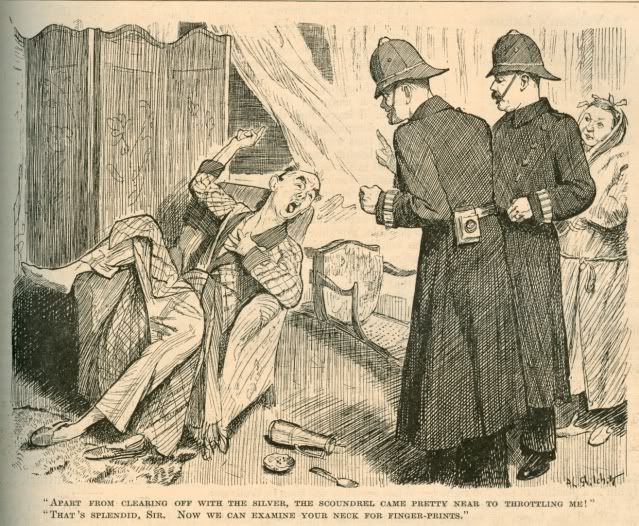
1935: ‘Advanced’ Forensics
No burglars appear in this cartoon. Instead we are presented with the scene when the police have arrived. The householder seeks to impress on the constables the extent of his physical suffering. The policeman on the left seeks to apply modern science to the task of apprehending the villain.
Clearly a further course of training is going to be needed.
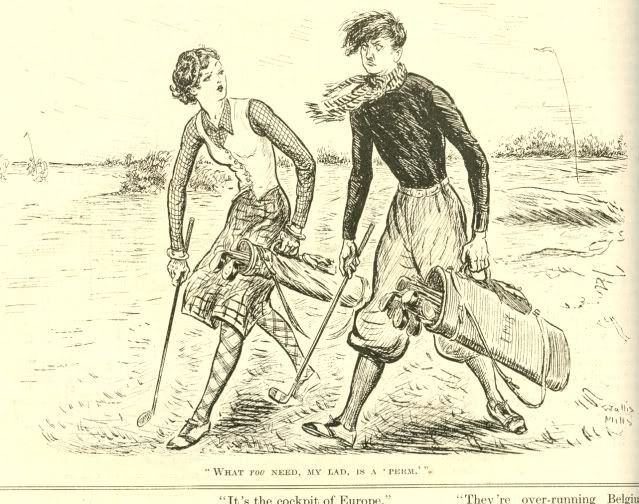
1935: Bossy Lady Golfer
This is by no means the funniest joke that has appeared in this thread. I suppose that the point is that she wishes to impose her solution to his problem. A suitably large cap could also deal with the situation.
I expect we are meant to realise that she is a bit of a bossy boots.
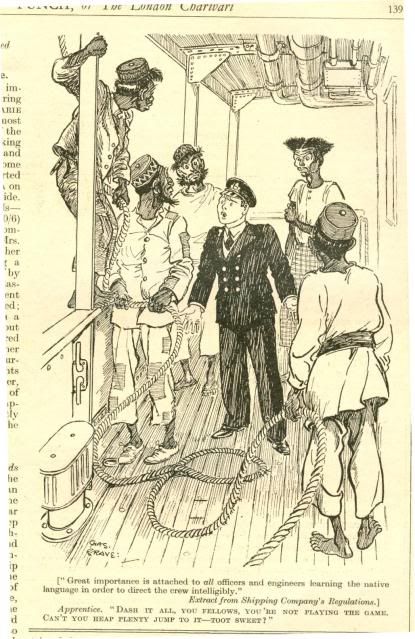
1935: Falling Short of Effortless Superiority
The apprentice knows what is expected of him. According to the imperial script he should, as befits a young (indeed a very young) Englishman, be able to exert his will over the ‘natives’. They clearly aren’t being bolshie; they simply can’t understand anything that he is saying.
Surely someone else is at fault for putting this boy into an impossible situation. I think his subordinates are what were then called lascars and their native language was Urdu. Why had he not received a course of training in that language so that at least he knew some basic commands?
Even so, this scene is a reminder of the days of empire when young Brits were expected naturally to assume command over locally employed people. The ‘joke’ here is that he can’t do it and is at a complete loss as to what he should do about it.
It looks as though he is attempting in vain to speak their language. ‘Plenty jump’ sounds like pidgin English to me. ‘Toot sweet’ is, of course, the French ‘tout suit’. He is desperately trying to say something foreign without realising how useless it is to speak any French to uneducated Asians.
This reminds of a not entirely dissimilar situation during my National Service at GHQ Singapore. I was in charge of an Education Centre, which occasionally would be taken over for Officer Selection Boards for Gurkhas. These were always presided over by a British General.
A group of young Gurkhas had assembled and I could see that they were very nervous. They were being addressed by a Major in the Royal Ulster Rifles. He clearly was trying to put them at their ease. So, instead of addressing them in his usual upper class English, he spoke with a strong Irish accent. I could see that the young lads were bewildered because they couldn’t understand what he was saying. I expect that the Major had got used to this way of speaking when dealing with young recruits back in Enniskillen.
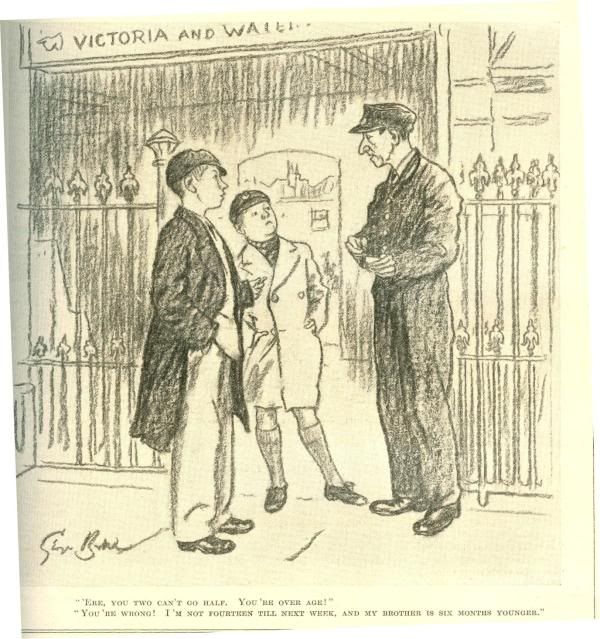
1935: Trying it On
George Belcher shows two schoolboys trying it on to avoid paying the full fare. They probably have other uses in mind for the difference between half fare and full fare. They do seem woefully ignorant of the facts of life.
As usual this artist gives us a convincing depiction of the scene.
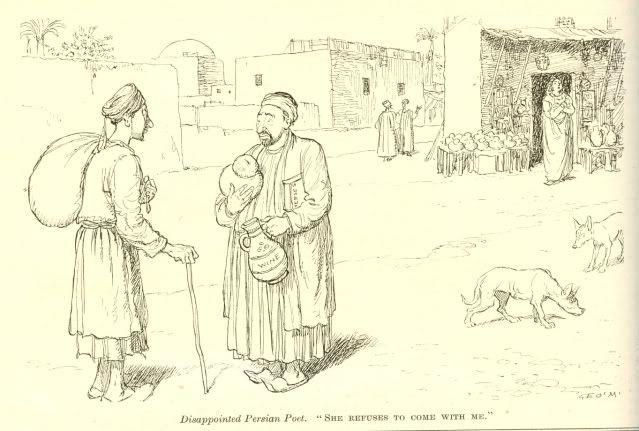
1935: A Different View of Omar Khayyám
A Book of Verses underneath the Bough,
A Jug of Wine, a Loaf of Bread–and Thou,
Beside me singing in the Wilderness,
And oh, Wilderness is Paradise enow.
I think that we have been conditioned to imagine the setting for the famous Rubaiyat as a palace with spacious gardens, sweet-scented lakes and fountains. The cartoonist here has imagined a more prosaic atmosphere in which the Persian poet finds himself unexpectedly rejected. Perhaps she is being presented as the owner of the shop selling earthenware pots. It may be that she is not susceptible to poetry at all.
Incidentally Wikipedia shows us that Omar was not only a poet. It seems that he was more famous as a Mathematician and Astronomer. He is a good representative of those Muslim scholars who achieved far more than their Western counterparts in the Sciences and the Arts during the early Middle Ages. Unfortunately that Eastern creative energy seems to have largely died out already before the Renaissance in the West.
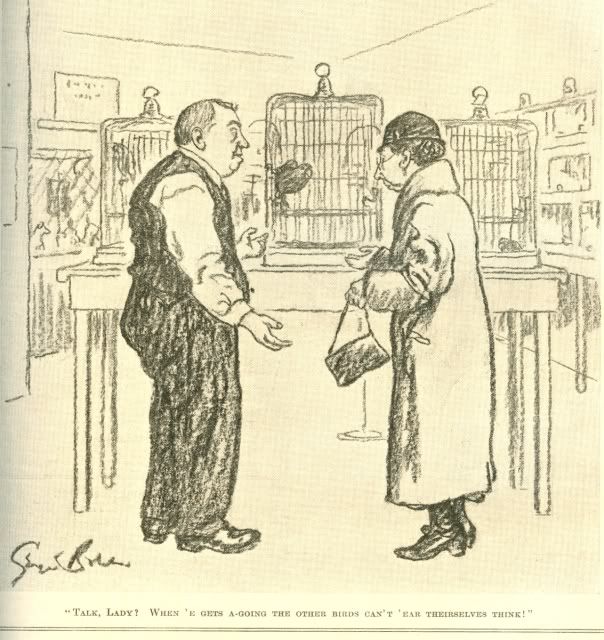
1935: In the Pet Shop - Again
George Belcher entertains us with another visit to the pet shop in which the owner sweet-talks the customer into parting with her money. Belcher seems to have been the licensed commentator in Punch on those who are not affluent.
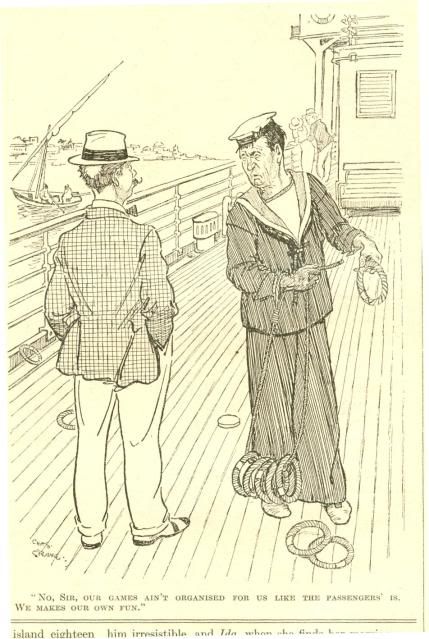
1935: Not His Idea of Fun
The cruise-ship passenger seems to assume that the sailor is playing some sort of variation of deck quoits. The sailor is far from pleased at this question but manages to give an answer that is ironic only to anyone who knows what he really is doing. We can easily see that he doesn’t regard it as fun at all.
If I had to guess what he is actually doing my answer would be that he is picking up the quoits that the passengers have left on the deck, then wind them through a rope, ready for the next occasion when the passengers have real ‘fun’.